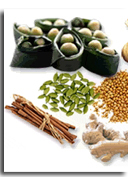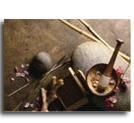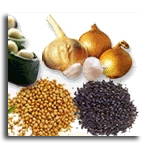|
|



|
 |
FAQs about Chinese Herbs
Q: What is
Chinese herbal medicine?
A: Chinese herbal medicine is
the main treatment method within Traditional Chinese Medicine (TCM). TCM
is the world’s oldest, continually practiced professional medicine. Its
written history stretches back over 2,000 years and its practice is
probably much older than that.
Although acupuncture was the first Chinese method of treatment to gain
wide acceptance in the West, Chinese herbal medicine is quickly
establishing itself as one of the most popular and effective alternative
therapies in the West.
Q: What is the difference between Western folk herbalism and Chinese
herbal medicine?
A: Western folk herbalism primarily treats diseases or symptoms, such as
headaches, runny nose, menstrual pain, etc. Chinese herbal medicine,
when practiced as a part of TCM, is based on an individualized pattern
diagnosis as well as a disease diagnosis. Your pattern is made up of
your signs and symptoms, your emotional temperament and the overall
composition of your body.
The TCM patient receives a custom written herbal prescription designed
to treat their individual pattern as well as the symptom or disease.
Q: Are there any other differences?
A: Western folk herbalism usually focuses on one symptom or disease at a
time and use a single herb or groups of herbs for treatment.
TCM formulas are crafted to treat your entire pattern as well as the
symptoms or disease that prompted you to seek treatment. TCM formulas
may include six to eighteen herbs to treat the symptoms or disease as
well as your entire pattern.
Q: Are all the “herbs” vegetable in origin?
A: Chinese herbal medicine may include vegetable, animal, and mineral
ingredients, however, the majority of ingredients are from vegetable
sources. Leaves, flowers, twigs, stems, roots, tubers, rhizomes, and
bark are among the parts of the vegetable used.
Q: Do all the herbs come from China?
A: The Chinese adopted and incorporated herbs from all over the world.
Fifteen to twenty percent of the 500 ingredients considered standard
originated from outside China. What makes these “Chinese” herbs is that
they are prescribed according to Chinese medical theory and a TCM
pattern diagnosis.
Q: Does Chinese herbal medicine work for Western patients?
A: Chinese herbal medicine may include vegetable, animal, and mineral
ingredients, however, the majority of ingredients are from vegetable
sources. Leaves, flowers, twigs, stems, roots, tubers, rhizomes, and
bark are among the parts of the vegetable used.
Q: Does Chinese herbal medicine work for Western patients?
A: Yes, Chinese herbal medicine works as well for Westerners as it does
for Chinese. Chinese herbal medicine has been used successfully in North
and South America, Europe, Africa, Australia, New Zealand, and all
throughout Asia.
Q: How are Chinese herbal medicines taken?
A: The traditional method of taking Chinese herbal medicine is drinking
a liquid, prepared by boiling the selected herbs. There are also herbal
pills, tinctures, and powdered extracts for those who do not have the
time or taste for drinking the more traditional liquid form.
Considering most patients may not have enough time to boil herbs and may
not accept bitter taste of herbal liquid, our TCM clinic uses powdered
extracts and capsules as well as pills made in Taiwan. It is very
convenient to be taken and suitable for either adults or children.
Q: Do Chinese herbal medicines have side effects?
A: Most of the components of Chinese herbal medicine have a very low
toxicity compared to even common, over-the-counter Western drugs. When
they are prescribed according to a correct TCM pattern diagnosis, they
should have few, if any, side effects, only beneficial healing results.
If you experience any discomfort while taking Chinese herbal medicine,
tell your practitioner who will modify the formula until there are no
side effects.
Q: What is Chinese herbal medicine good for?
A: Chinese herbal medicine treats the full range of human disease. It is
used to treat:
-
Acute diseases, like intestinal flu and the common cold
-
Chronic diseases, such as allergies, gynecological disorders,
autoimmune diseases, and chronic viral diseases
-
Degenerative diseases due to aging
Chinese herbal medicine is especially good for promoting the body’s
ability to heal and recover from illness.
Q: Can pregnant women take Chinese herbs?
A: A professional TCM practitioner can write prescriptions that are
appropriate for pregnant women and lactating mothers.
Q: Can children take Chinese herbal medicine?
A: Yes again. Pediatrics is a specialty within TCM and children can be
given reduced dosages. There are also specially prepared pediatric
herbal medicines in pill and power form. Chinese herbal medicine can
treat atopic eczema, colic, earache, diarrhea, cough, and fever in
babies and children.
Q: How long does it take to see results with Chinese herbal medicine?
A: In acute conditions, results may occur in a matter of hours. In
chronic conditions, some results should be seen within two weeks.
Although chronic conditions may require taking Chinese herbal medicine
for a long time, signs that the medicine is working should be apparent
to the patient and practitioner alike almost from the very start.
Q: How do I know if a practitioner is professionally trained in Chinese
herbal medicine?
A: Although Chinese herbal medicines are safe when prescribed by a
trained, knowledgeable practitioner, they are strong medicine. Patients
should ask about where the practitioner trained, how long the training
was, how long he or she has been in practice, and what experience the
practitioner has had in treating the patient’s specific ailment.
Chinese herbal medicine may be part of the testing done where
acupuncture is a licensed and regulated healthcare profession. Ask your
practitioner if your state requires a license to practice; more than 40
states (New York is one of them) in the United States do. In states that
do not currently require licensing, patients should ask their
practitioner if they are certified by the National Commission for the
Certification of Acupuncture and Oriental Medicine (NCCAOM).
|
Other Conditions
Commonly Treated by Dr. Zheng
- Hot flashes,
menopause, PMS, irregular menstruation
- Stress, depression, anxiety,
insomnia, fatigue
- Hey-fever, sinusitis, asthma,
bronchitis
- Infertility, impotence
- Dizziness, vertigo, Meniere’s disease
- Hypertension, diabetes, obesity
- Stroke, paralysis, Bell’s palsy
- Indigestion, diarrhea, constipation
- Quitting smoking, beauty &
rejuvenation
SPECIAL SERVICES
- We offer free initial consultation
- We accept health insurance plans
which cover for acupuncture treatment. We may contact
your insurance company to verify your acupuncture
benefits. If you need us to do so, please tell us your
insurance information including your full name,
birthday,insurance ID number, and insurance company’s
Tel. number.
|
|
|




